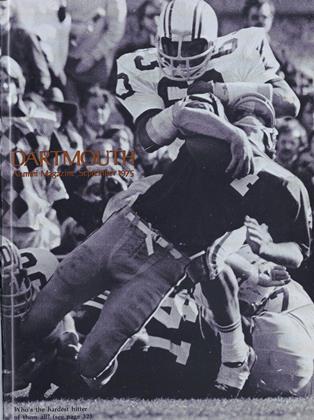The living space is mostly that of Daisiana Caffrey, a girl with a lovely body, feather-weight bra in, and soft heart: for example, she casually gives a $32,000 emerald ring to a bartender who can't afford an engagement ring for his girl. This occurs after the death of her bitchy stepmother and alcoholic father, whose millions she inherits. The ring is retrieved by her husband, Charles du Chaudrun, scion of a decadent French aristocratic family. He comes to New York after the war, makes do as a film editor and producer of documentaries, marries Daisiana and "takes care" of her as she goes in and out of Hickory Hollow, a sanitarium for the rich in Connecticut. For, as a child, she has communed under the kitchen table with the Little Lord Jesus, Joseph, and Mary, with whom she feels "safe." This fantasy gets out of control: "she had no power to alter her own course. She was an object in space."
The space shifts in time: Chicago, New York, Paris, and back to St. Constance in the West Indies where the novel opens as Daisiana has just shot Charles with an elephant gun. As counterpoint to the couple and their ambiance of the idle rich, Canby gives us Jimmy Barnes, "whose life appears in perfect order." He is the youngest of three sons of a Chicago family, financially on the skids, a product of Williams and the Yale Law School. Having once kissed Daisy in kindergarten, he sleeps with her years later rather febrilely in Chicago till she drifts to New York City; then marries Cleo, a muscular maiden, "whose complexion was artifice not completely disguising old acne." His fortune is made when he becomes the legal watch-dog of Daisy's millions. After her death her ancestral farm in Illinois becomes a "dig," unearthing a culture older than Egypt. Jimmy visits the site. That night, "before going to sleep, Jimmy masturbated. His life had come to this: it was the safest, most sensible way." On this note the book ends.
Through Charles we've had a view of Egypt: "the tomb of Tutankhamen, which was filled with people from Cleveland." The book reminded me of Dos Passos' USA: the detail, the behavioristic technique, the sensory emphasis: outer space rather than the inner space of emotional life. Omission of numbers on the even pages tempts me to say that half of life is left out; as Canby's being a movie critic (one of our best) tempts me to say that the novel is a film's-eye-view of life: a superficial and unjust comment. For the difference between LivingSpace and USA is in the tone, as I hope my quotations have shown; that they've given you a hint of Canby's factitiously objective, dead-pan- tongue-in-cheek approach, which conceals a subtle, wryly funny appraisal of the aimlessness, emptiness, and boredom of too much of the "civilization" of the country "which has achieved the highest standard of living in the world." In brief, Canby's novel is Thoreau's famous sentence up-dated: "The mass of men lead lives of unquiet desperation".
LIVING QUARTERS. By VincentCanby '45. Knopf, 1975. 227 pp.$6.95.
At Dartmouth College Professor Emeritus Morse taught courses in American, English, andContinental fiction.
 View Full Issue
View Full Issue
More From This Issue
-
 Feature
FeatureThe First 25 Years of the Dartmouth Bequest and Estate planning Program
September 1975 By Robert L. Kaiser '39 and Frank A. Logan '52 -
 Feature
FeatureThe Computer Goes Fishing
September 1975 By DARREL MANSELL -
 Feature
FeatureFive Plays for All Seasons
September 1975 By DREW TALLMAN and JACK DeGANGE -
 Feature
FeatureAlumni Fund Chairman's Report
September 1975 -
 Feature
FeatureAn Irresistible Force?
September 1975 -
 Feature
FeatureReport of the Office of Development
September 1975
STEARNS MORSE
-
 Books
BooksTOLSTOY
JANUARY 1929 By Stearns Morse -
 Article
ArticleSidney Cox Prize Established
November 1953 By Stearns Morse -
 Books
BooksTHE AMERICAN NOVEL AND ITS TRADITION.
December 1957 By STEARNS MORSE -
 Books
BooksTHE LETTERS OF ROBERT FROST TO LOUIS UNTERMEYER.
JANUARY 1964 By STEARNS MORSE -
 Books
BooksSELECTED LETTERS OF ROBERT FROST.
DECEMBER 1964 By STEARNS MORSE -
 Books
BooksROBERT FROST 100: A CENTENNIAL PUBLICATION.
December 1974 By STEARNS MORSE







